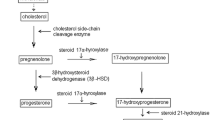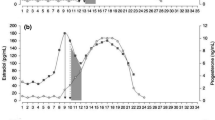Abstract
The effect of a single bout of exercise on hormones affecting bone metabolism was studied in 25 early postmenopausal women with osteopenia. The complex training session was performed between 8:00 a.m. and 9:05 a.m. Serum concentrations of dehydroepiandrosterone-sulfate (DHEA-S), total testosterone, free testosterone, 17β-estradiol, cortisol, human growth hormone (hGH), insulin-like growth factor-I (IGF-I), and insulin-like growth factor binding protein-3 (IGFBP-3) were determined. Blood samples were obtained immediately before (baseline) and after exercise, as well as 2 h and 22 h post-exercise. DHEA-S increased by 10% immediately after exercise and remained increased 2 h later. Testosterone showed no increase immediately after exercise but fell by 21% 2 h post-exercise. Free testosterone was increased by almost 20% immediately after exercise and returned to baseline levels after 2 h. Two hours post-exercise a 20% increase in the estradiol level was measured. Cortisol decreased by 36% during exercise and a further 14% during the next 2 h, a loss higher than the normal diurnal decrease. hGH increased by 80% during exercise and fell 30% under baseline values after 2 h. Even though the assessment period was prolonged to 22 h no significant change could be demonstrated for IGF-I. Serum IGFBP-3 showed a biphasic increase. During the exercise session IGFBP-3 increased by 35%, returned to baseline values 2 h post-exercise and increased again by 40% 22 h post-exercise. In summary, this study showed that a single bout of exercise typically used in osteoporosis prevention programs could have an influence on hormones affecting bone metabolism.








Similar content being viewed by others
References
Bamman MM, Shipp JR, Jiang J, Gower BA, Hunter GR, Goodman A, McLafferty CL, Urban RJ (2001) Mechanical load increases muscle IGF-I and androgen receptor mRNA concentrations in humans. Am J Physiol 280:E383–E390
Borst SE, De Hoyos DV, Garzarella L, Vincent K, Pollock BH, Lowenthal DT, Pollock ML (2001) Effects of resistance training on insulin-like growth factor-I and IGF binding proteins. Med Sci Sports Exerc 33:648–653
Collett-Solberg PF, Cohen P (1996) The role of the insulin-like growth factor binding proteins and the IGFBP proteases in modulating IGF action. Endocrinol Metab Clin North Am 25:591–614
Craig BW, Brown R, Everhart J (1989) Effects of progressive resistance training on growth hormone and testosterone levels in young and elderly subjects. Mech Ageing Dev 49:159–169
Cullen DM, Smith RT, Akhter MP (2001) Bone-loading response varies with strain magnitude and cycle number. J Appl Physiol 91:1971–1976
Cumming DC, Rebar RW, Stern B (1989) The effect of acute exercise on endocrine homeostasis. In: Rogol A, Laron Z (eds) Hormones and sport. Serono, New York, pp 73–87
De Cree C (1998) Sex steroid metabolism and menstrual irregularities in the exercising female. A review. Sports Med 25:369–406
Felsing NE, Brasel JA, Cooper DM (1992) Effect of low and high intensity exercise on circulating growth hormone in men. J Clin Endocrinol Metab 75:157–162
Fordyce DE, Starnes JW, Farrar RP (1991) Compensation of the age-related decline in hippocampal muscarinic receptor density through daily exercise or underfeeding. J Gerontol 46:B245–248
Frost HM (1992) The role of changes in mechanical usage set points in the pathogenesis of osteoporosis. J Bone Miner Res 7:253–261
Gotshalk LA, Loebel CC, Nindl BC, Putukian M, Sebastianelli WJ, Newton RU, Hakkinen K, Kraemer WJ (1997) Hormonal responses of multiset versus single-set heavy-resistance exercise protocols. Can J Appl Physiol 22:244–255
Greendale GA, Barrett-Connor E, Edelstein S, Ingles S, Haile R (1995) Lifetime leisure exercise and osteoporosis. The Rancho Bernardo Study. Am J Epidemiol 141:951–959
Hagberg JM, Seals DR, Yerg JE, Gavin J, Gingerich R, Premanchandra R (1988) Metabolic responses to exercise in young and older athletes and sedentary men. J Appl Physiol 65:900–908
Hakkinen K, Pakarinen A (1995) Acute hormonal responses to heavy resistance exercise in men and women at different ages. Int J Sports Med 16:507–513
Hakkinen K, Pakarinen A, Newton RU, Kraemer WJ (1998) Acute hormone responses to heavy resistance lower and upper extremity exercise in young versus old men. Eur J Appl Physiol 77:312–319
Hakkinen K, Pakarinen A, Kraemer WJ, Newton RU, Alen M (2000) Basal concentrations and acute responses of serum hormones and strength development during heavy resistance training in middle-aged and elderly men and women. J Gerontol A Biol Sci Med Sci 55:B95–105
Hakkinen K, Pakarinen A, Kraemer WJ, Hakkinen A, Valkeinen H, Alen M (2001) Selective muscle hypertrophy, changes in EMG and force, and serum hormones during strength training in older women. J Appl Physiol 91:569–580
Heinonen A, Kannus P, Sievanen H, Oja P, Pasanen M, Rinne M, Uusi-Rasi K, Vuori I (1996) Randomised controlled trial of effect of high-impact exercise on selected risk factors for osteoporotic fractures. Lancet 348:1343–1347
Heshmati HM, Khosla S, Robins SP, O'Fallon WM, Melton LJ III, Riggs BL (2002) Role of low levels of endogenous estrogen in regulation of bone resorption in late postmenopausal women. J Bone Miner Res 17:172–178
Hornum M, Cooper DM, Brasel JA, Bueno A, Sietsema KE (1997) Exercise-induced changes in circulating growth factors with cyclic variation in plasma estradiol in women. J Appl Physiol 82:1946–1951
Hymer WC, Kraemer WJ, Nindl BC, Marx JO, Benson DE, Welsch JR, Mazzetti SA, Volek JS, Deaver DR (2001) Characteristics of circulating growth hormone in women after acute heavy resistance exercise. Am J Physiol 281:E878–E887
Johnson LG, Kraemer RR, Haltom R, Kraemer GR, Gaines HE, Castracane VD (1997) Effects of estrogen replacement therapy on dehydroepiandrosterone, dehydroepiandrosterone sulfate, and cortisol responses to exercise in postmenopausal women. Fertil Steril 68:836–843
Jorgensen JO, Blum WF, Moller N, Ranke MB, Christiansen JS (1990) Circadian patterns of serum insulin-like growth factor (IGF) II and IGF binding protein 3 in growth hormone-deficient patients and age- and sex-matched normal subjects. Acta Endocrinol (Copenh) 123:257–262
Kemmler W, Engelke K, Lauber D, Weineck J, Hensen J, Kalender WA (2002) Exercise effects on fitness and BMD in early postmenopausal women: 1 year EFOPS results. Med Sci Sports Exerc 34:2115–2123
Kemmler W, Engelke K, Lauber D, Weineck J, Hensen J, Kalender WA (2003) The Erlangen Fitness Osteoporosis Prevention Study (EFOPS) – a controlled exercise trial in early postmenopausal women with low bone density: First year results. Arch Phys Med Rehabil 84:673–682
Kraemer WJ (1988) Endocrine responses to resistance exercise. Med Sci Sports Exerc 20:S152–157
Kraemer WJ (1992) Endocrine response and adaption to strength training. In: Komi V (ed) Strength and power in sport. Blackwell, Oxford, pp 291–304
Kraemer WJ (1998) Acute and long-term hormonal adaptions to strength training in men and women. In: Hakkinen K (ed) International conference on weightlifting and strength training. Lahti, Finland, pp 23–28
Kraemer WJ, Marchitelli L, Gordon SE, Harman E, Dziados JE, Mello R, Frykman P, McCurry D, Fleck SJ (1990) Hormonal and growth factor responses to heavy resistance exercise protocols. J Appl Physiol 69:1442–1450
Kraemer WJ, Gordon SE, Fleck SJ, Marchitelli LJ, Mello R, Dziados JE, Friedl K, Harman E, Maresh C, Fry AC (1991) Endogenous anabolic hormonal and growth factor responses to heavy resistance exercise in males and females. Int J Sports Med 12:228–235
Kraemer WJ, Fleck SJ, Dziados JE, Harman EA, Marchitelli LJ, Gordon SE, Mello R, Frykman PN, Koziris LP, Triplett NT (1993) Changes in hormonal concentrations after different heavy-resistance exercise protocols in women. J Appl Physiol 75:594–604
Kraemer WJ, Aguilera BA, Terada M, Newton RU, Lynch JM, Rosendaal G, McBride JM, Gordon SE, Hakkinen K (1995) Responses of IGF-I to endogenous increases in growth hormone after heavy-resistance exercise. J Appl Physiol 79:1310–1315
Kraemer RR, Johnson LG, Haltom R, Kraemer GR, Gaines H, Drapcho M, Gimple T, Castracane VD (1998) Effects of hormone replacement on growth hormone and prolaktin responses in postmenopausal women. J Appl Physiol 84:703–708
Lee MS, Kang CW, Ryu H, Kim JD, Chung HT (1999) Effects of ChunDoSunBup Qi-training on growth hormone, insulin-like growth factor-I, and testosterone in young and elderly subjects. Am J Chin Med 27:167–175
Maddalozzo GF, Snow CM (2000) High intensity resistance training: effects on bone in older men and women. Calcif Tissue Int 66:399–404
Mazzeo RS (2000) Aging, immune function, and exercise: hormonal regulation. Int J Sports Med 21 [Suppl 1]:S10–13
Nicklas BJ, Ryan AJ, Treuth MM, Harman SM, Blackman MR, Hurley BF, Rogers MA (1995) Testosterone, growth hormone and IGF-I responses to acute and chronic resistive exercise in men aged 55–70 years. Int J Sports Med 16:445–450
Nindl BC, Marx JO, Kraemer WJ, Arciero PJ, Dohi K, Kellogg MD, Loomis GA (2001) Overnight responses of the circulating IGF-I system after acute, heavy-resistance exercise. J Appl Physiol 90:1319–1326
Nyomba BL, Berard L, Murphy LJ (1997) Free insulin-like growth factor I (IGF-I) in healthy subjects: relationship with IGF-binding proteins and insulin sensitivity. J Clin Endocrinol Metab 82:2177–2181
Pritzlaff CJ, Wideman L, Weltman JY, Abbott RD, Gutgesell ME, Hartman ML, Veldhuis JD, Weltman A (1999) Impact of acute exercise intensity on pulsatile growth hormone release in men. J Appl Physiol 87:498–504
Pyka G, Wiswell RA, Marcus R (1992) Age-dependent effect of resistance exercise on growth hormone secretion in people. J Clin Endocrinol Metab 75:404–407
Pyka G, Taaffe DR, Marcus R (1994) Effect of a sustained program of resistance training on the acute growth hormone response to resistance exercise in older adults. Horm Metab Res 26:330–333
Ranke MB, Elmlinger M (1997) Functional role of insulin-like growth factor binding proteins. Horm Res 48 [Suppl 4]:9–15
Rozenberg S, Kroll M, Pastijn A, Vandromme J (1995) Osteoporosis prevention and treatment with sex hormone replacement therapy. Clin Rheumatol 14 [Suppl 3]:14–17
Schmidt W, Lison S, Blum WF, Münte T, Brabant G (1998) Rekombinantes und endogen produziertes Wachstumshormon wirken unterschiedlich auf das IGF1 System. Dtsch Z Sportmed 49:140–144
Schwarz AJ, Brasel JA, Hintz RL, Mohan S, Cooper DM (1996) Acute effect of brief low- and high-intensity exercise on circulating insulin-like growth factor (IGF) I, II, and IGF-binding protein-3 and its proteolysis in young healthy men. J Clin Endocrinol Metab 81:3492–3497
Sidney KH, Shephard RJ (1977) Growth hormone and cortisol—age differences, effects of exercise and training. Can J Appl Sport Sci 2:189–193
Turner CH, Forwood MR, Rho JY, Yoshikawa T (1994) Mechanical loading thresholds for lamellar and woven bone formation. J Bone Miner Res 9:87–97
Underwood LE, Thissen JP, Lemozy S, Ketelslegers JM, Clemmons DR (1994) Hormonal and nutritional regulation of IGF-I and its binding proteins. Horm Res 42:145–151
Wallace BA, Cumming RG (2000) Systematic review of randomized trials of the effect of exercise on bone mass in pre- and postmenopausal women. Calcif Tissue Int 67:10–18
Wallace JD, Cuneo RC, Baxter R, Orskov H, Keay N, Pentecost C, Dall R, Rosen T, Jorgensen JO, Cittadini A, Longobardi S, Sacca L, Christiansen JS, Bengtsson BA, Sonksen PH (1999) Responses of the growth hormone (GH) and insulin-like growth factor axis to exercise, GH administration, and GH withdrawal in trained adult males: a potential test for GH abuse in sport. J Clin Endocrinol Metab 84:3591–3601
Willis PE, Chadan S, Baracos V, Parkhouse WS (1997) Acute exercise attenuates age-associated resistance to insulin-like growth factor I. Am J Physiol 272: E397–E404
Wolff I, van Croonenborg JJ, Kemper HC, Kostense PJ, Twisk JW (1999) The effect of exercise training programs on bone mass: a meta-analysis of published controlled trials in pre- and postmenopausal women. Osteoporos Int 9:1–12
Yen SS (1977) The biology of menopause. J Reprod Med 18:287–296
Author information
Authors and Affiliations
Corresponding author
Rights and permissions
About this article
Cite this article
Kemmler, W., Wildt, L., Engelke, K. et al. Acute hormonal responses of a high impact physical exercise session in early postmenopausal women. Eur J Appl Physiol 90, 199–209 (2003). https://doi.org/10.1007/s00421-003-0874-7
Accepted:
Published:
Issue Date:
DOI: https://doi.org/10.1007/s00421-003-0874-7




